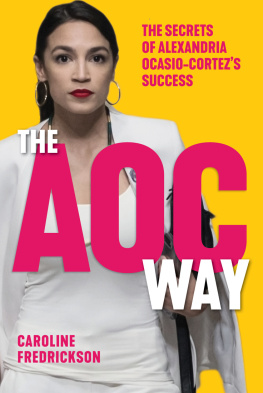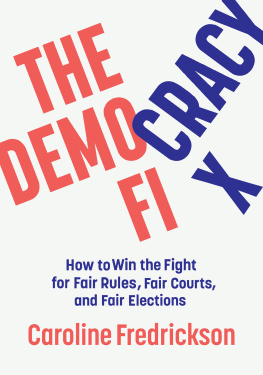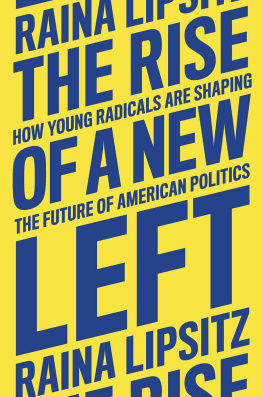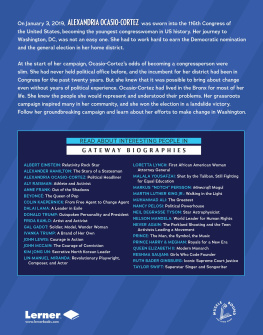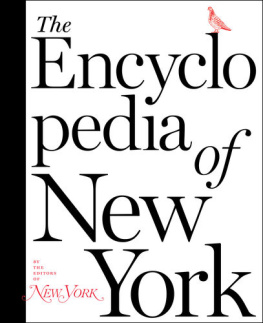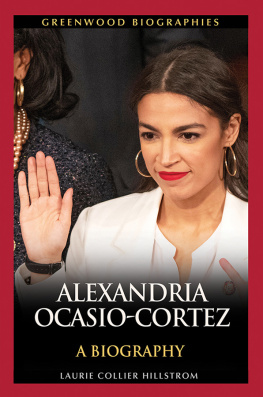
Copyright 2020 by Caroline Fredrickson
All rights reserved. No part of this book may be reproduced in any manner without the express written consent of the publisher, except in the case of brief excerpts in critical reviews or articles. All inquiries should be addressed to Skyhorse Publishing, 307 West 36th Street, 11th Floor, New York, NY 10018.
Skyhorse Publishing books may be purchased in bulk at special discounts for sales promotion, corporate gifts, fund-raising, or educational purposes. Special editions can also be created to specifications. For details, contact the Special Sales Department, Skyhorse Publishing, 307 West 36th Street, 11th Floor, New York, NY 10018 or .
Skyhorse and Skyhorse Publishing are registered trademarks of Skyhorse Publishing, Inc., a Delaware corporation.
Visit our website at www.skyhorsepublishing.com.
10 9 8 7 6 5 4 3 2 1
Library of Congress Cataloging-in-Publication Data is available on file.
Cover design by Brian Peterson
Cover photo credit Getty Images
ISBN: 978-1-5107-5208-5
Ebook ISBN 978-1-5107-5209-2
Printed in the United States of America
Contents
Introduction
IN MAY 2019, I WAS at a conference in Flathead, Montana, focused on democracy and transparency in government, where activists and academics were discussing campaign finance reform and voting rights. During a panel discussion I was moderating on the challenges to making democracy more secure in America, a speaker lamented about how hard it can be to explain the impact of these issues to people outside the Beltway and connect dark money and the nefarious influence of special interests to the life experiences of average Americans. Not true, one of the panelists replied. He pointed out that newly elected congresswoman Alexandria Ocasio-Cortez had just done that very thing in a hearing on a pro-democracy bill. He had actually teed up a video of her questioning a witness that silenced the roomboth in Congress when it happened and in Montana where we watched it. Ocasio-Cortez, popularly known as AOC, asked her questions in a way that illustrated the truly sordid nature of lobbying and dark money in Washington. With one question logically following another and building on the witnesss answer, she showed how the dollars that flow from these special interests drive lawmakers to draft legislation (or even more commonly to use drafts written by the lobbyists themselves) that benefit those very interestswith the unsurprising result that the legislative process is actually undercutting our democracy and economic justice.
As part of his presentation on new communications strategies to advance democracy, the speaker on the panel used this clip of Ocasio-Cortez at the hearing to show how we could do our work better. AOC took her witness step by step through the process by which a lobbyist gives money to politicians and at the same time writes bills that the members of Congress introduce and vote for. It was so well done, was so easy to understand, and was so disturbing that the NowThis video of her questioning went viral. A subject that seemed esoteric and unrelatable was all of a sudden clear. And it wasnt just in explaining how the process worked that was so effective but also how AOC then connected this environment of slimy backroom backslapping and influence peddling to concrete outcomes that harm low-wage workers and vulnerable families in favor of banks and insurance companies. And the video was seen by millions of viewers across the country. That was real impact.
At the end of the video, everyone in that room in Montana had a smile on their face. They looked at each other in happy amazement as if to say, finally, someone who can bring these issues alive for new audiences and make them care deeply. To make real for the American people the true costs of having a political system where money buys not just access but outcomes has been a challenge for reformers. Here in one hearing, AOC had done itand social media meant that people around the country could learn from her and share her clip with their friends and family. It had an exponential impact. One of AOCs real talents is an intuitive grasp of how to translate complex but important issues and to make them understandable; and, more importantly, to make them seem relevant to those who arent glued to MSNBC day in, day outto those who might have gotten turned off by politics because they didnt think their voice counted or because the system seemed too broken for them to make a difference.
Those of us in the fight for social justice struggle constantly with how to explain complex issues to a broad audienceand then to get people to care and to give them meaningful ways to take action. It may be the single biggest challenge we face as advocates. Even when the public is generally on our side, we have difficulties in making our proposals to fix our broken democracy or address systemic breakdowns resonate with the public as forcefully as health care or economic distress. And then even if we can do that, we have the extra heavy lift of giving people something they can do about itand then getting them to do it. In one short congressional hearing, Ocasio-Cortez was able to achieve much of this: expose a simple and compelling explanation of a problem, connect it to peoples daily lives as a matter of urgency, propose real solutions, get people to pay attention. That the House moved forward on the legislation may have had something to do with the fact that House members heard from their constituents that the issue was of central importance. AOC gave a textbook lesson in advocacy. I, for one, was taking notes.
Like many people, I heard first about AOC after she beat an incumbent congressman in a Democratic primary. Initially, I found her intriguing as a harbinger (I hoped) of a more progressive and diverse leadership for the left. But as I spent more time following her career, I saw that she was more than that. She was transformative, a young and engaging social media influencer who could inject a spark into policy debates and be a force multiplier for democratic change.
As an advocate working on democracy and rule-of-law issues in Washington, DC, I had been focused for the duration of the Donald Trump presidency on trying to shore up our constitutional framework and fight back against corruption and self-dealing. Part of my work has involved writing and speaking out about the Russian interference in our elections in 2016 and hence on the investigation led by Special Counsel Robert Mueller at the Department of Justice. When President Trumps former attorneyor fixerMichael Cohen was called to testify in front of a congressional committee, I was watching to see what he might say. I had few hopes for a real breakthrough since most congressional hearings just serve as vehicles for members of Congress to promote themselves rather than as real opportunities for advancing ideas or challenging policies. And to some extent that description was true for the Cohen hearing. But among the several new members who approached the hearing differently was Alexandria Ocasio-Cortez. She came well-prepared to use her question time to ask questions! and to ask follow-up questions! That may not seem unusual, but, trust me, it is. A typical member uses the time for pontificating or bloviating, rarely getting to a question and instead making a statement. Even when they do ask a question, they almost never pay attention to the answer. Not only did she ask questions and build on what she learned through further inquiries, but she used her time the way a good lawyer in a trial wouldto lead a witness through the evidence in order to establish the proof behind her arguments, and, in this case, to outline areas for further investigation. It was a masterful showing. Charlotte Alter, in a profile she wrote for Time , exclaimed Shes a political phenomenon: part activist, part legislator, arguably the best storyteller in the party since Barack Obama and perhaps the only Democrat right now with the star power to challenge President Donald Trumps. After AOC was done asking her questionsalong with several other new membersthe Democrats had a road map to pursue investigations into Trumps alleged efforts to hide or diminish the value of his assets to fend off creditors and inflate them to get more loans and insurance payments. The sequencing of her questions was crisp, specific, and actionable.
Next page
